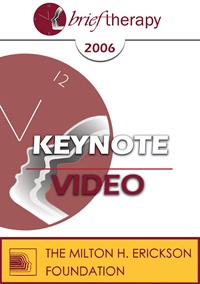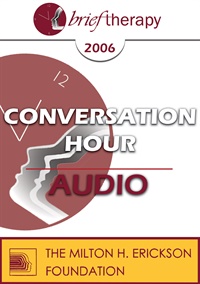
- Average Rating:
- Not yet rated
- Topic Areas:
- Conversation Hours | Brief Therapy | Therapist Development
- Categories:
- Brief Therapy Conference | Brief Therapy Conference 2006
- Faculty:
- Erving Polster, PhD
- Duration:
- 57:19
- Format:
- Audio Only
- Original Program Date:
- Dec 08, 2006
- Short Description:
- BT06 Conversation Hour 07 - Contact & Awareness - Erving Polster, PhD
- Price:
- $15.00 - Base Price
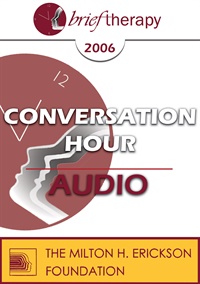
- Average Rating:
- Not yet rated
- Topic Areas:
- Conversation Hours | Brief Therapy | Therapeutic Relationship | Therapist Development
- Categories:
- Brief Therapy Conference | Brief Therapy Conference 2006
- Faculty:
- Jeffrey Kottler, PhD
- Duration:
- 59:35
- Format:
- Audio Only
- Original Program Date:
- Dec 08, 2006
- Short Description:
- BT06 Conversation Hour 08 - Integrative Brief Therapy: Use of Self - Jeffrey Kottler, PhD
- Price:
- $15.00 - Base Price
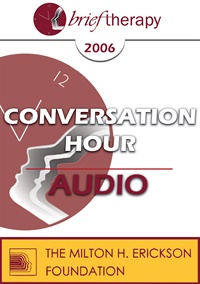
- Average Rating:
- Not yet rated
- Topic Areas:
- Conversation Hours | Brief Therapy | Therapeutic Relationship | Therapist Development
- Categories:
- Brief Therapy Conference | Brief Therapy Conference 2006
- Faculty:
- Steve Andreas, MA, NLP
- Duration:
- 58:28
- Format:
- Audio Only
- Original Program Date:
- Dec 08, 2006
- Short Description:
- BT06 Conversation Hour 10 - Creating & Adjusting Effective Personal Boundaries - Steve Andreas, MA
- Price:
- $15.00 - Base Price
- Average Rating:
- Not yet rated
- Topic Areas:
- Keynotes | Therapist Development | Brief Therapy
- Categories:
- Brief Therapy Conference | Brief Therapy Conference 2006
- Faculty:
- Erving Polster, PhD
- Course Levels:
- Master Degree or Higher in Health-Related Field
- Duration:
- 52:24
- Format:
- Audio and Video
- Original Program Date:
- Dec 08, 2006
- Short Description:
- Through the special focus which therapy technique induces, therapists often lose touch with the power of such ordinary experiences as humor, friendliness, self-disclosure, approval/disapproval, banter, etc. via a live therapy session, Polster will show how these exchanges may join technique to tighten up the therapy experience and speed up the process.
- Price:
-
Sale is $29.00
price reduced from Base Price - $59.00
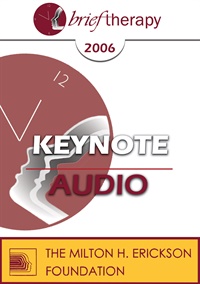
- Average Rating:
- Not yet rated
- Topic Areas:
- Keynotes | Brief Therapy | Psychotherapy | Therapist Development
- Categories:
- Brief Therapy Conference | Brief Therapy Conference 2006
- Faculty:
- Nicholas Cummings, PhD
- Duration:
- 1:14:34
- Format:
- Audio Only
- Original Program Date:
- Dec 09, 2006
- Short Description:
- Psychotherapy has the lowest remuneration among all health professions, according to U.S. Labor statistics. Most practices are languishing, while others are prospering. What are the elements that make the difference between success and failure? Hear from psychotherapy's leading entrepreneur how innovation and its implementation can not only change your practice, but also enable you to make a difference.
- Price:
- $15.00 - Base Price
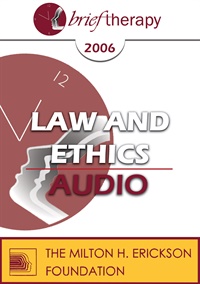
- Average Rating:
- Not yet rated
- Topic Areas:
- Law & Ethics | Therapist Development
- Categories:
- Brief Therapy Conference | Brief Therapy Conference 2006
- Faculty:
- A. Steven Frankel, PhD, JD, ABPP
- Duration:
- 3:34:49
- Format:
- Audio Only
- Original Program Date:
- Dec 06, 2006
- Short Description:
- The Laws and Ethics Workshop covers emerging legal and ethical issues for mental health practitioners of all disciplines. The four-hour program addresses issues including confidentiality and privilege, note-taking, record-keeping, coping with subpoenas, the impact of professional society ethical codes on regulation of mental health practice, liability exposure with suicidal patients, and recent developments in “Tarasoff situations.”
- Price:
- $15.00 - Base Price
Tags: Ethics Law Therapist Development
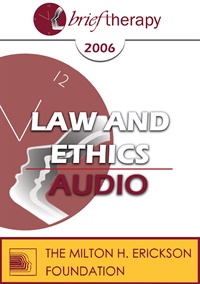
- Average Rating:
- Not yet rated
- Topic Areas:
- Law & Ethics | Therapist Development
- Categories:
- Brief Therapy Conference | Brief Therapy Conference 2006
- Faculty:
- A. Steven Frankel, PhD, JD, ABPP
- Duration:
- 1:47:57
- Format:
- Audio Only
- Original Program Date:
- Dec 06, 2006
- Short Description:
- This program focuses more closely on the needs of clinicians who fall into particularly high risk groups. Topics include confidentiality and privilege for children, coping with high-conflict divorce/custody families, the regressive impact of the regulatory environment on family therapy in particular, supervision/consultation issues that arise for professionals whose agency positions may include functions that conflict with ethical codes.
- Price:
- $15.00 - Base Price
Tags: Ethics Law Therapist Development
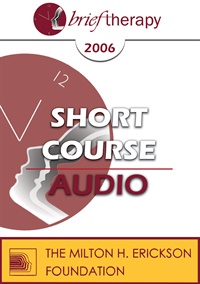
- Average Rating:
- Not yet rated
- Topic Areas:
- Short Courses | Brief Therapy | Goals of the Therapist | Therapist Development
- Categories:
- Brief Therapy Conference | Brief Therapy Conference 2006
- Faculty:
- Christine Guilloux, DESS Psychology
- Duration:
- 57:14
- Format:
- Audio Only
- Original Program Date:
- Dec 07, 2006
- Short Description:
- Subject, patient, client, supervisor, supervised, therapist, all of us are shaped from an essence, the stuff we are made of, the hero within. After drawing up an inventory and statement of the basic heroes that we have integrated and the stories that are the ones of our deep metaphors, we will travel and explore those resources that have contributed to our construction and our structure in productive and counterproductive ways. This workshop will offer ways to uti- lize them in our therapeutic goals for inner change.
- Price:
- $15.00 - Base Price
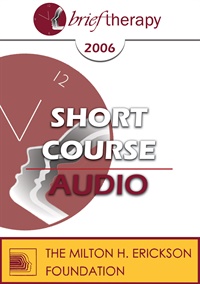
- Average Rating:
- Not yet rated
- Topic Areas:
- Short Courses | Brief Therapy | Hypnosis | Therapist Development
- Categories:
- Brief Therapy Conference | Brief Therapy Conference 2006
- Faculty:
- Rubin Battino, MS
- Duration:
- 1:19:30
- Format:
- Audio Only
- Original Program Date:
- Dec 07, 2006
- Short Description:
- The expectation of the therapist that therapy can be both very brief and effective is the essence of working in the very brief mode, i.e., the therapist rarely sees the client more than one or two times. Typical methods used are: the miracle question, changing personal history, guided metaphor, conversational reframing, Rossi's "moving hands," and hypnosis. Case examples will be given, and the group will be invited to participate in a brief hypnotic change experience.
- Price:
- $15.00 - Base Price
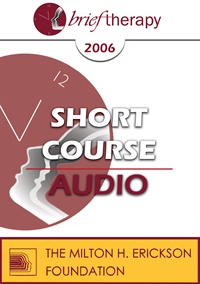
- Average Rating:
- Not yet rated
- Topic Areas:
- Short Courses | Brief Therapy | Therapist Development | Treatment Planning
- Categories:
- Brief Therapy Conference | Brief Therapy Conference 2006
- Faculty:
- Jennifer Weniger, PhD
- Duration:
- 1:09:42
- Format:
- Audio Only
- Original Program Date:
- Dec 07, 2006
- Short Description:
- The process of teaching the patient life skills is the most critical component of therapy. Effective therapists teach patients skills in order to successfully navigate through life. Everything that a therapist does is "education" in some form, and patients need practical skills in order their quality of life.
- Price:
- $15.00 - Base Price
Please wait ...


